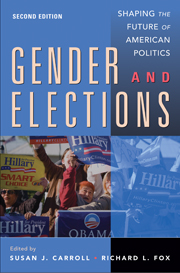Book contents
- Frontmatter
- Contents
- List of Figures, Text Boxes, and Photos
- List of Tables
- Acknowledgments
- Contributors
- Introduction: Gender and Electoral Politics in the Early Twenty-First Century
- 1 Presidential Elections: Gendered Space and the Case of 2008
- 2 The 2008 Candidacies of Hillary Clinton and Sarah Palin: Cracking the “Highest, Hardest Glass Ceiling”
- 3 Voter Participation and Turnout: Female Star Power Attracts Women Voters
- 4 Voting Choices: The Politics of the Gender Gap
- 5 Latinas and Electoral Politics: Movin' on Up
- 6 African American Women and Electoral Politics: A Challenge to the Post-Race Rhetoric of the Obama Moment
- 7 Congressional Elections: Women's Candidacies and the Road to Gender Parity
- 8 Political Parties and Women's Organizations: Bringing Women into the Electoral Arena
- 9 Advertising, Web Sites, and Media Coverage: Gender and Communication along the Campaign Trail
- 10 State Elections: Why Do Women Fare Differently across States?
- Index
- References
6 - African American Women and Electoral Politics: A Challenge to the Post-Race Rhetoric of the Obama Moment
Published online by Cambridge University Press: 05 June 2014
- Frontmatter
- Contents
- List of Figures, Text Boxes, and Photos
- List of Tables
- Acknowledgments
- Contributors
- Introduction: Gender and Electoral Politics in the Early Twenty-First Century
- 1 Presidential Elections: Gendered Space and the Case of 2008
- 2 The 2008 Candidacies of Hillary Clinton and Sarah Palin: Cracking the “Highest, Hardest Glass Ceiling”
- 3 Voter Participation and Turnout: Female Star Power Attracts Women Voters
- 4 Voting Choices: The Politics of the Gender Gap
- 5 Latinas and Electoral Politics: Movin' on Up
- 6 African American Women and Electoral Politics: A Challenge to the Post-Race Rhetoric of the Obama Moment
- 7 Congressional Elections: Women's Candidacies and the Road to Gender Parity
- 8 Political Parties and Women's Organizations: Bringing Women into the Electoral Arena
- 9 Advertising, Web Sites, and Media Coverage: Gender and Communication along the Campaign Trail
- 10 State Elections: Why Do Women Fare Differently across States?
- Index
- References
Summary
The election of President Barack Obama as America's first African American president has prompted many commentators and pundits to assert that America is entering into a post-race moment in which race and racial politics are no longer a part of America's political tapestry. Obama enjoyed widespread support from across the electorate, winning even in states that had not supported Democratic presidential candidates in recent years, the so-called red states. Defying the Democratic Party's declining support among white voters, Obama fared quite well with many white voters. Not since the election of Lyndon B. Johnson in 1964 has the Democratic Party carried a majority of white voters, and winning the white vote has been a challenge for Democrats since that time. Jimmy Carter lost the white vote by four percentage points in 1976, and Bill Clinton lost the white vote by two percentage points in 1992 and in 1996. Obama lost white voters by twelve percentage points, improving on the records of Senator John Kerry, who lost white voters by seventeen points in 2004, and Vice President Al Gore, who lost among whites by thirteen points in 2000.
Obama's successful run for the presidency and relative success across broad and diverse groups of Americans has prompted suggestions that America is now a post-race society in which race and racial politics are a thing of the past.
- Type
- Chapter
- Information
- Gender and ElectionsShaping the Future of American Politics, pp. 165 - 186Publisher: Cambridge University PressPrint publication year: 2009
References
- 1
- Cited by



